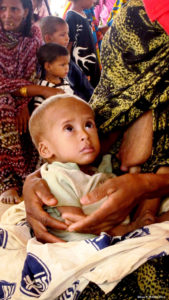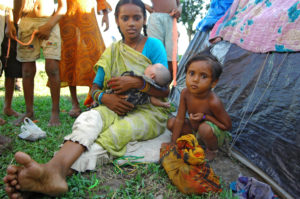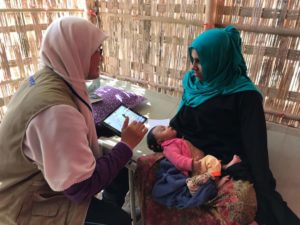
Women and young children face greater risks and adversities in resource-restrained camps ( Dr. Ellen Girerd-Barclay © WABA 2014)
Consider this. A refugee camp outfitted to prioritise the needs of women, infants and young children – specifically, breastfeeding. What may that look like? Specific tents that afford the dignity and privacy to breastfeed. Skilled support for breastfeeding mothers to manage common problems such as poor milk supply, engorged breasts and lack of confidence. Greater rations for a breastfeeding mother, perhaps even a priority queue when accessing supplies. Supporting women to relactate, encouraging the use of wet nurses and donor human milk.
We argue that this scenario is necessary and possible, indeed urgent.
The world is experiencing an unprecedented refugee crisis. UNHCR estimates that almost 66 million people are displaced and among them, 22.5 million are refugees. These numbers are increasing with each conflict and natural disaster sweeping across the globe. UNHCR further estimates that women and children are the majority of refugees and displaced persons. Our TV screens and news feeds are inundated with horrific images of malnourished infants in varying stages of distress. Of helpless mothers left with little option but to watch cholera, pneumonia and diphtheria ravage what’s left of their babies’ bodies.

In 2016, Refugees Deeply called it the ‘Quiet crisis of Europe’s Pregnant Refugees’ claiming that 60 percent of refugees and migrants were women and children ( Mohammad Rakibul Hasan © WABA 2008 )
Aid organisations wrestle for coverage on mainstream and social media, each time issuing still more dire warnings of the need for more nourishments to be brought in from foreign destinations.There never seems to be enough. The situation is ironic, we see repeats of the news cycle of crises, exodus, dying babies and disempowered mothers, and a desperate plea for more aid from afar. To compound matters, air, land and sea ports are blocked and aid cannot be transported to intended recipients. We ask simply why more effort is not put into supporting the procurement of locally available resources? One locally available food resource, often overlooked, is breastmilk.
Breastmilk contains all the energy and nutrients a baby needs for the first six months of life and continues to be a substantial food resource into age two. Breastmilk strengthens immune systems, all-important in refugee camps teething with a lack of hygiene and poor sanitation. Breastfeeding requires no intermediary – no bottles, no teats, no running water, no fuel or electricity. Put simply, breastfeeding is the safest and best option for any infant or young child in refugee camps.
Why then do refugee camps, as they often exist today, procure tonnes of baby formula to distribute to a population at high risk of death and disease? The procurement and transport of food aid is by design intentional and organised. Infant formula is either bulk purchased or donated in large quantities, and transported by land, sea and air only to be thrust upon traumatised, misinformed women hardly positioned to fight for their right to breastfeed or their child’s right to be breastfed.
Why is the option to breastfeed not protected, promoted and supported? And still more important, why is the right of a mother to breastfeed, and the right of a child to be breastfed not supported? Formula should only be procured for the relatively few babies who require it based on a needs assessment and after all other viable options have been explored.
Now, consider this. The procurement and transport of food aid is by design intentional and organized. Infant formula is either bulk purchased or donated in large quantities, and transported by land, sea and air only to be thrust upon traumatized, misinformed women hardly positioned to fight for their right to breastfeed or their child’s right to be breastfed.
Refugee camps are the ‘emergency rooms’ of any crisis – sound public health solutions must be made available to its patients, including every accommodation to ensure that refugee women are supported to breastfeed their young, and at-risk infants receive the nutrition they need. Aid organisations and host governments must proactively integrate these solutions into the management and operations of refugee camps.

Lactation Consultant Dr. Zaharah Sulaiman, also a WABA local Board member, in Cox’s Bazaar, Bangladesh ( Zaharah Sulaiman © 2018)
WABA works to protect, promote and support breastfeeding around the world, and the refugee context is not an exception. Guidelines on Infant feeding in emergencies issued by the Emergency Nutrition Network and UNICEF have been updated as recently as October 2017 – a standard that should become the norm as quickly as possible. Dr Zaharah Sulaiman, a Lactation Consultant from Universiti Sains Malaysia who just returned from Cox’s Bazaar in Bangladesh where 650,000 Rohingya refugees take shelter estimated that 10,000 children will be born in just the first three months of 2018. We can save many of them, if we prioritise breastfeeding now, one refugee camp at a time.
Consider that.